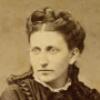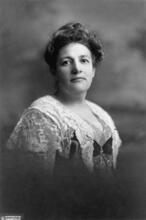Florence Prag Kahn
Florence Prag Kahn was born to a family deeply involved in public service. She graduated the University of California in 1887, one of only seven women in her class. During her years as secretary to her husband, Congressman Julius Kahn, Florence formulated her own political positions. She succeeded her husband after his death via special election, but would go on to win reelection five times, from 1925 to 1937. She became the first woman to serve on the Military Affairs Committee and introduced legislation that shaped the Bay Area of San Francisco, including the building of military installations and the Bay Bridge. Kahn also belonged to many Jewish and secular organizations. Her legacy is one of both women's and Jewish leadership for the coming generations.
“There is no sex in citizenship and there should be none in politics.” So believed Florence Prag Kahn, the first Jewish woman to serve in the United States Congress. Though she arrived in the House of Representatives via a special election after the death of her Republican congressman husband, Julius Kahn, in 1924, she went on to win reelection in her own right five times (1925–1937) and to play a major role in shaping the economy and the geography of the San Francisco Bay Area.
Early Life and Family
Born in Salt Lake City, on November 9, 1866, but raised in San Francisco, Florence Prag Kahn was the first child of Mary (Goldsmith) Prag and Conrad Prag. Her only brother, Jessie, died at age ten in 1879. Conrad Prag, a Jewish merchant born in Warsaw, Poland, traveled to gold rush country in 1849, and in 1851 he helped found San Francisco’s Congregation Sherith Israel. Kahn’s mother came to San Francisco as a child of five and was raised in the city’s young Jewish community. Mary Prag was a religious school (Congregation Emanu-El) and high school teacher who went on to become a vice principal and serve on the San Francisco Board of Education from 1921 until her death in 1935 at age eighty-nine. Florence was raised in a home that emphasized both Jewish and secular education.
Education and Marriage
That she graduated from the University of California in 1887 as one of only seven women in a class of forty gives some idea of her intense drive for education and achievement. Following in her mother’s footsteps, she made teaching her profession, and taught high school English and history. On March 19, 1899, she married Julius Kahn, and the couple had two sons, Julius Jr. (b. 1902) and Conrad Prag (b. 1906). While her mother set an example for Kahn in public service, her husband brought her to national attention. Born in Germany, Julius Kahn came to San Francisco as a child.
Political Beginnings
Kahn and her husband arrived in Washington, D.C., as newlyweds in 1899. With Florence as his secretary, Julius Kahn would serve continuously in the House, except for the term 1902–1904, until his death in 1924. While very responsive to the needs of his constituents in California’s Fourth Congressional District, Julius Kahn was especially concerned, as a member of the Military Affairs Committee, with the issue of preparedness. It was he, for example, who introduced the bill authorizing a draft following America’s entry into World War I in 1917. When Florence Kahn succeeded him, she would follow his lead in her devotion to her district and to preparedness—but not out of blind allegiance to her late husband’s memory. Rather, she had formulated her own ideas about public policy over the course of the decades.
Thanks to the columns she wrote for the San Francisco Chronicle in 1919 and 1920 while a congressional wife needing to supplement the family income, a great deal is known about Kahn’s views before she became a politician in her own right. Indeed, Kahn’s subsequent claim, when running to succeed her husband, that she had spent many hours haunting the House gallery is borne out by her close analyses of public issues.
Time in Office
Kahn had the conceptual and strategic capacities to envision sweeping changes for the Bay Area, and the political skills to implement them—at a time when only a tiny handful of women sat in Congress. For example, in her annual report to her constituents in 1930, shortly after she became the first woman to serve on the Military Affairs Committee, she discussed the military installations that she saw as good for her region and for the country. During her tenure in office, she introduced legislation that led to the creation of Moffett Field in Sunnyvale, Alameda Naval Air Station, and Hamilton Field, and to the building of the Bay Bridge linking Oakland and San Francisco. Newspaper accounts describe her as successfully maneuvering to get her bills passed. That she had a close relationship with her party no doubt helped her to be effective.
A deeply conservative woman, Kahn had opposed woman suffrage before California adopted it in 1911. As a member of Congress, she was a party loyalist. Yet she was also the first Republican member to dine in the Roosevelt White House in the 1930s. Said the frequently acerbic Alice Roosevelt Longworth, daughter of Theodore Roosevelt, in 1934: “Mrs. Kahn, shrewd, resourceful, and witty, is an all-around first-rate legislator, the equal of any man in Congress and the superior of most.” In her years in Congress, Kahn was noteworthy for her opposition to Prohibition and to movie censorship.
Affiliations and Philanthropy
Belonging to many Jewish and secular organizations, in both San Francisco and Washington, Kahn supported the National Council of Jewish Women, Hadassah, the Association of University Women, and the Congressional Club. She was also a member of Congregation Emanu-El in San Francisco. Kahn possessed a sparkling wit, often bringing her Jewishness to the forefront. As the daughter and granddaughter of founders of San Francisco and its Jewish community, Kahn was especially qualified to represent its diverse population.
When Florence Prag Kahn died on November 16, 1948, she left a legacy of women’s and Jewish leadership for generations to follow. Truly, she was a female politician ahead of her time.
AJYB 44:413, 47:629, 51:522.
BEDAJ.
DAB 4.
Dalin, David G. “Jewish and Non-Partisan Republicanism in San Francisco, 1911–1963.” American Jewish History 68 (June 1979): 492–516.
EJ, s.v. “Kahn, Julius.”
Gelfand, Duff. “Gentlewomen of the House.” American Mercury 18 (October 1929): 151–160.
Hansen, Harriet. “Woman Enters Politics: San Francisco’s Pioneer Congresswoman, Florence Prag Kahn.” Master’s thesis, San Francisco State University (1969).
Kahn, Florence Prag. Papers. Western Jewish Center, Judah Magnes Museum, Berkeley, CA.
Keyes, Frances Parkinson. “The Lady from California.” Delineator 118 (February 1931).
Longworth, Alice Roosevelt. “What Are the Women Up To?” Ladies’ Home Journal 51 (March 1934).
NAW.
Obituary. NYTimes, November 17, 1948, 27:5.
Prag, Mary Goldsmith. “Early Days.” Typescript, Kahn Papers. Western Jewish History Center, Berkeley, CA.
Stern, Norton B. “The Prags in Brief.” Western States Jewish History 17 (January 1985): 163–169.
UJE, s.v. “Kahn, Julius.”
WWIAJ (1926, 1928, 1938).
WWWIA 2.






